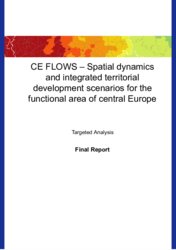A call for change: Potentials of transnational cooperation for a more integrated central Europe
What does the future hold for central Europe? Will this functional area further integrate or will the process slow down due to the COVID-19 pandemic? The newly published ESPON CE-FLOWS Targeted Analysis presents three development scenarios for future cooperation and integration in the area by the year 2030, considering also the impact of the COVID-19 pandemic and the role of transnational cooperation.
Experts taking a closer look at central Europe
The international team of researchers identified key development potentials, drivers and bottlenecks for future integration in central Europe. On that basis, the study provides in-depth insights into the spatial dynamics and existing flows across regions in central Europe in four main thematic fields: economic interactions and networks, flow of people, environmental hazards, accessibility and connectivity. Also, it looks into how transnational cooperation structures, governance mechanisms and solutions could be tailored to reduce economic and social disparities and foster integrated territorial development in central Europe.
East-West divide still visible
The researchers found that – despite decades of interactions and active cooperation among central European regions – the East-West divide, rooted in the historical, political and economic development of area, is still visible. Significant discrepancies between regions are in particular evident in terms of research and development patterns, accessibility and labour commuting, pollution, energy production and consumption. Statistical analysis then allowed to forecast different trends and scenarios for future integration in central Europe by 2030, highlighting also potential territorial impacts of the expected development trends. The analysis resulted in three development scenarios characterised by different levels of economic, social and environmental integration: a New Normality scenario, an Integration scenario, and a Partial Integration scenario.
Scenarios for the functional area of central Europe
The outcome expected for 2030 in the New Normality scenario is significant economic growth in central European regions hit hardest by the health crisis (e.g. Italian regions). In these regions the rebound would be more significant and offset the losses accumulated in the first wave of the pandemic. Despite slightly lower GDP growth rates, the overall economic performance of central European regions would remain stronger in the long run due to the lower losses registered during 2020. What distinguishes the New Normality scenario from the Integration and the Partial Integration scenarios is the expected long-term impact of the pandemic on other economic and non-economic indicators different from GDP. Notably, particulate matter emissions would decrease in the Integration scenario, due to the fact that through further integrating central Europe, manufacturing activities could further concentrate in fewer production plants, thus resulting in a decrease in transport-induced emissions. The researchers found that this effect is particularly strong for regions in which manufacturing plants still employ a relevant share of the labour force, because a more integrated approach to production would have the greatest benefit there. However, the pandemic might also have long-term negative effects on trust among people and mobility for different purposes and this is reflected in the Partial Integration scenario. As a result, the growth would be weaker in foreign direct investments and in 2030 there would be negative border effects in high-tech manufacturing activities, lower trust and reduced social capital and tourist flows.
Last but not least, the researchers looked at how transnational cooperation could influence the realisation of the most positive integration scenario. They will present their recommendations for the first time in the European Week of Regions and Cities online session “A call for change: How transnational cooperation realises ESPON policy recommendations” on Wednesday, 13 October from 17h30 to 18h30. The expert presentation will be complemented by an introduction to the first call for project proposals of the transnational Interreg CENTRAL EUROPE Programme, which aims to put key recommendations into practice. Registration to the event is still possible.

